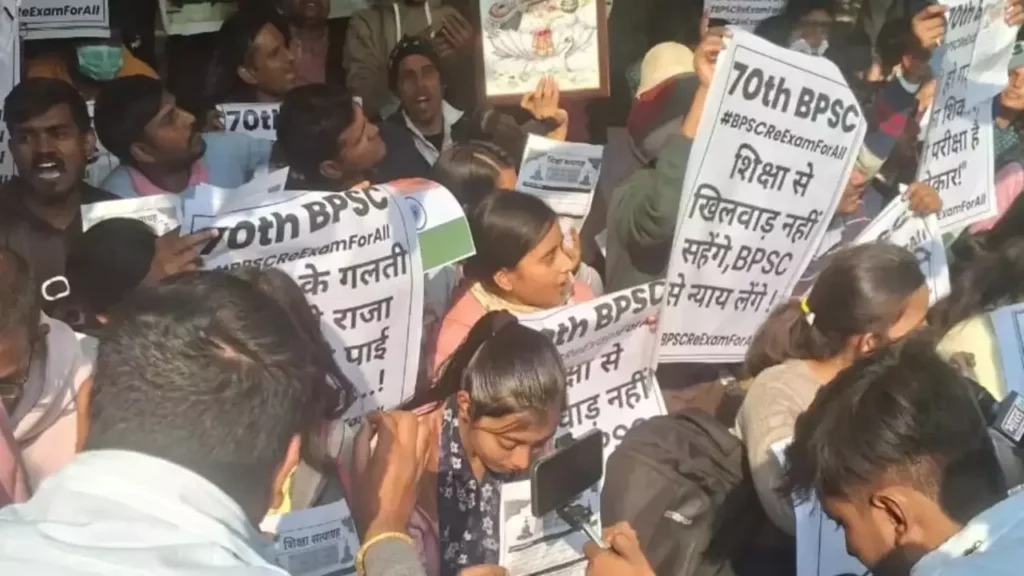By – Prakarsh Kastwar
The Bihar Public Service Commission (BPSC) 70th Combined Preliminary Exam, held on December 13, 2024, has been embroiled in a series of controversies, leading to widespread protests from students and political involvement. The exam, which aimed to recruit candidates for 2,031 positions, including 200 posts for SDM (Sub-Divisional Magistrate) and 136 posts for DSP (Deputy Superintendent of Police), has seen significant unrest since its occurrence. This article delves into the entire controversy surrounding the BPSC exam, detailing the events and key issues involved.

Background of the Exam
The BPSC 70th Combined Preliminary Exam was advertised in September 2024, with a staggering 4,83,000 candidates applying. Of these, approximately 3,25,000 candidates appeared for the examination. The exam was conducted to fill various government posts under the Bihar Public Service Commission, including important roles like SDM, DSP, and other gazetted positions.
However, the controversy surrounding the exam began even before it took place. On December 6, just a week before the exam, rumors started circulating regarding the possibility of the Bihar Public Service Commission (BPSC) implementing a “normalization” process in the exam. This sparked concerns among students about its impact on the fairness and merit of the examination, though BPSC dismissed these rumors as baseless.
The Normalization Controversy
Normalization refers to the process used when an exam is conducted in multiple shifts. If one shift’s paper is more difficult than another’s, students in the more challenging shift tend to score lower. In such cases, normalization adjusts the scores of students in the harder shift to balance the overall result. This ensures that all candidates, regardless of which shift they took the exam in, are evaluated on an equal footing.
However, students feared that if BPSC applied normalization to the 70th Combined Preliminary Exam, it could distort merit rankings. They argued that if the papers differed in difficulty levels across shifts, the use of normalization would affect their ranking unfairly. In response, students demanded that the exam be conducted in a single shift to avoid the need for normalization altogether. Despite these concerns, BPSC denied the possibility of any such action, calling the rumors unfounded.
Issues During the Exam
On the day of the exam, December 13, 2024, problems surfaced at the Bapu Examination Complex in Patna, which served as one of the key exam centers. There were delays in distributing question papers to the candidates, leading to significant unrest among students. The Bapu Examination Complex was one of the largest exam centers, with approximately 12,000 candidates scheduled to take the exam that day. The delay in the distribution of question papers led to a chaotic situation at the center, sparking protests and further escalating tensions.
In response to these issues, BPSC decided to re-conduct the exam at the Bapu Examination Complex on January 4, 2025. However, students rejected this decision, claiming that re-conducting the exam at just one center would compromise the fairness of the entire process. They demanded that the entire examination be held again, as they believed the issue at one center could have affected the overall integrity of the exam.

The Role of Politics in the Protest
The protests over the BPSC exam soon gained political traction, with several political leaders and parties joining the debate. Student protests, particularly in areas like Gardanibagh in Patna, intensified, with demonstrators calling for a re-examination of the entire process. These protests were supported by various student organizations and backed by opposition politicians, further fueling the controversy.
While students continue to demand a re-examination for all, BPSC has remained firm on its stance, asserting that only the candidates from the affected center (Bapu Examination Complex) will have their exam re-conducted. Despite this, the protests show no sign of abating, and political figures continue to weigh in on the issue.
Allegations from Students
In addition to the delay at the Bapu Examination Complex, several other allegations have surfaced regarding the examination process. Some students claimed that certain centers lacked functioning CCTV cameras, leading to concerns over the security and transparency of the exam. Others pointed out that the question paper appeared to bear striking similarities to model papers from coaching institutes, raising suspicions about the paper-setting process.
Furthermore, some students alleged that the difficulty level of the BPSC exam was unusually low, with claims that the paper resembled the pattern of a police recruitment exam rather than a state civil services examination. These concerns further fueled the protests, as students argued that an easier paper would result in a higher cutoff, potentially skewing the merit list.
BPSC, however, rejected these allegations, stating that if the paper was indeed easier, it would simply lead to a higher cutoff. The commission assured students that there was no need for concern and that the evaluation process would be transparent.

Political Fallout
The BPSC exam controversy has not only created a stir among students but has also been heavily politicized. Several opposition leaders have voiced their support for the students’ demand for a re-examination. The involvement of political figures has further complicated the situation, with some accusing the Bihar government of mishandling the exam process. As the protests continue, it remains to be seen how the government and BPSC will address these growing concerns.
Conclusion
The controversy surrounding the BPSC 70th Combined Preliminary Exam is far from over. With students demanding a re-examination of the entire process and political forces getting involved, the situation continues to unfold. While BPSC has taken steps to address issues at specific centers, such as re-conducting the exam for affected candidates, students remain unconvinced. The future of the exam and its results hangs in the balance, with a tense atmosphere surrounding the entire recruitment process. As the protests persist, both BPSC and the Bihar government will need to find a way to restore confidence in the examination system and ensure that the recruitment process remains fair and transparent.

